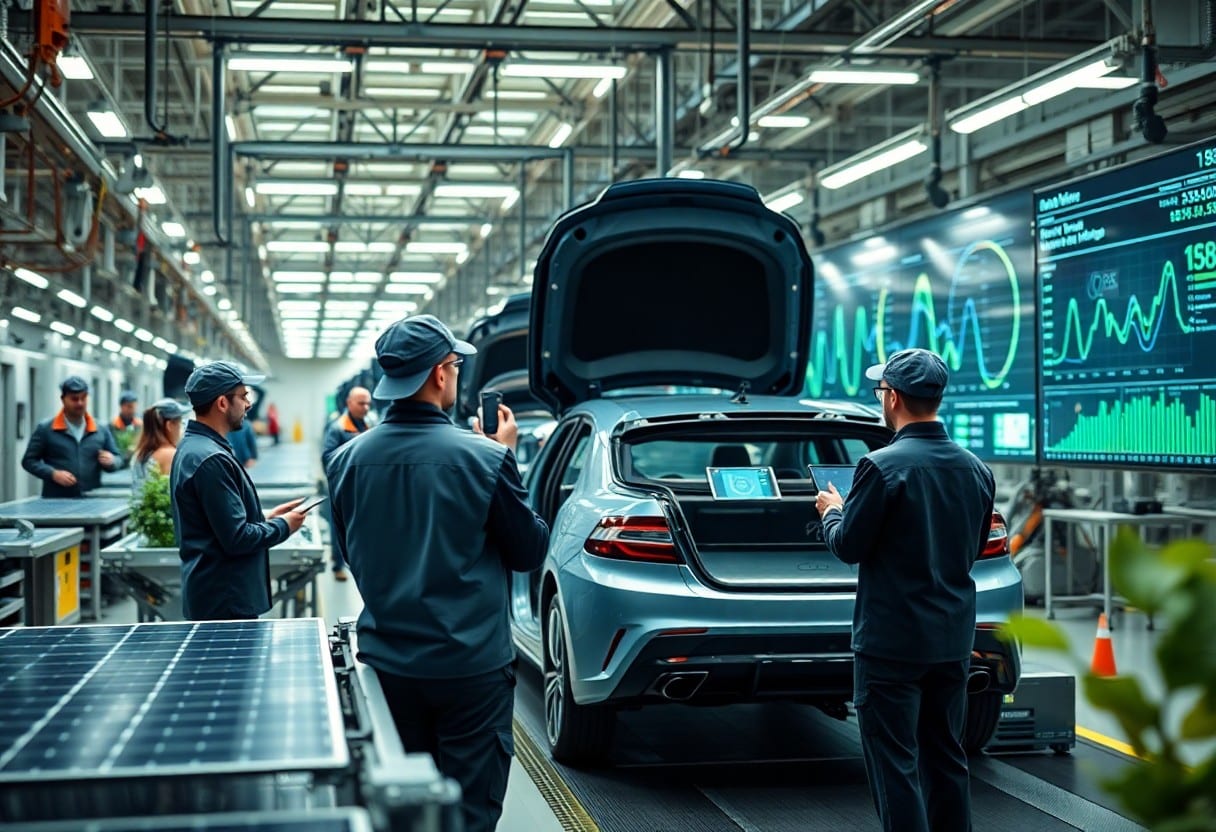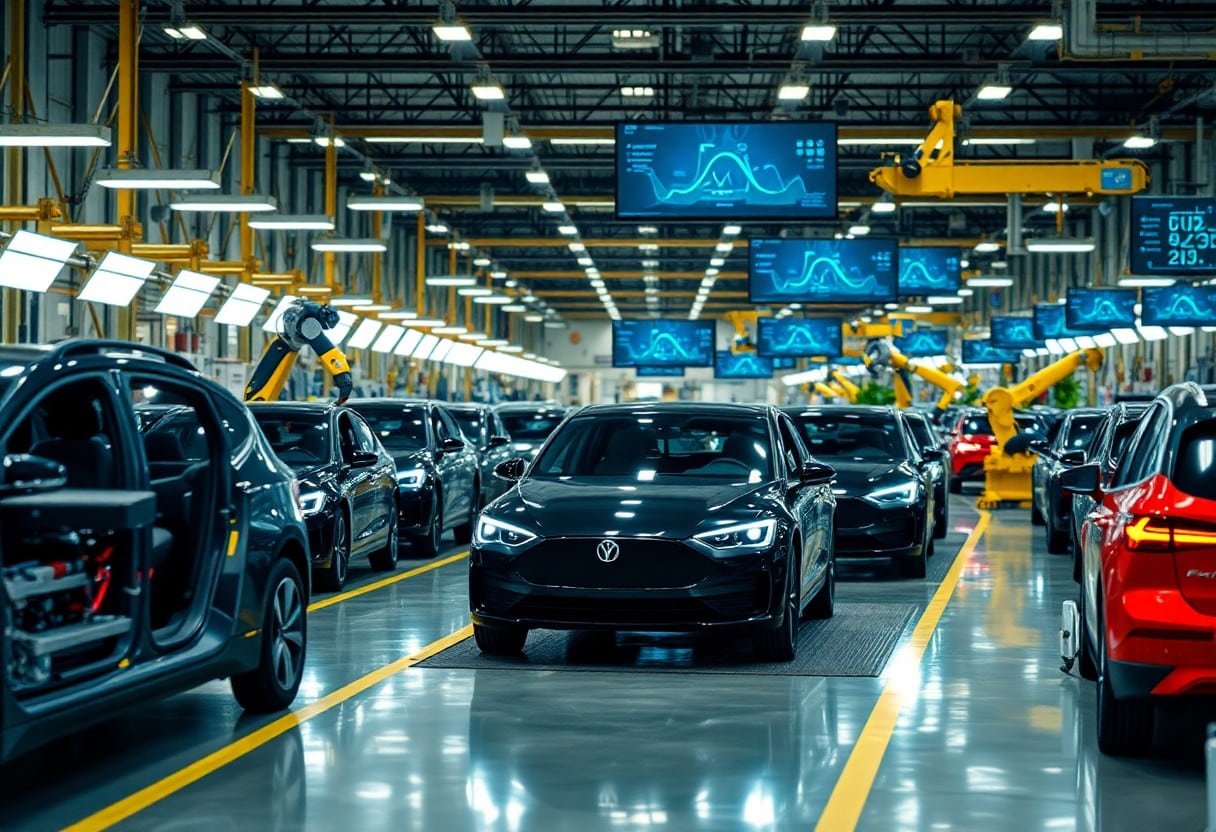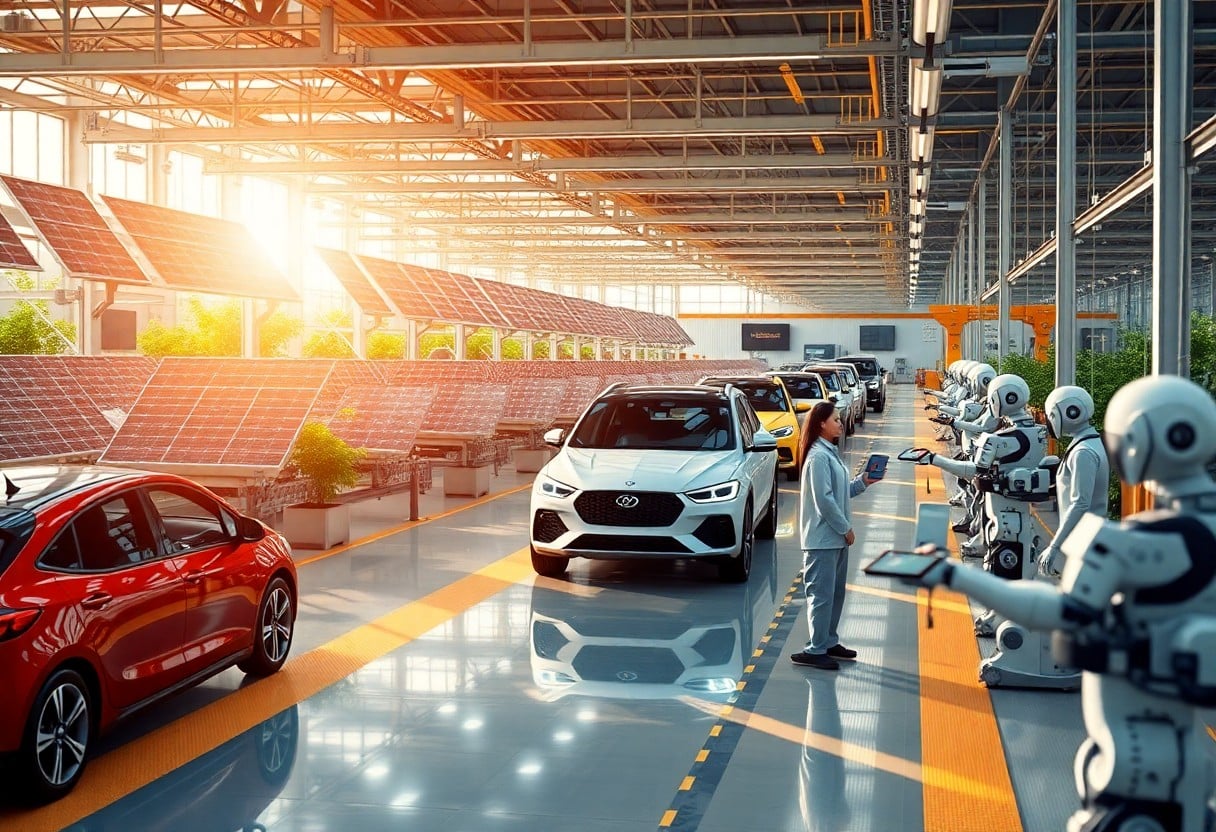Just as the automotive industry evolves, so must your understanding of sustainable manufacturing practices. By 2025, digital transformation is reshaping how vehicles are produced, emphasizing eco-friendly materials and processes that reduce environmental impact. By embracing this green shift, you can enhance your competitiveness and contribute to a more sustainable future. This blog post will guide you through the innovative strategies that define sustainable automotive manufacturing, ensuring you are informed and prepared for industry changes ahead.
Key Takeaways:
- Sustainable practices in automotive manufacturing are increasingly integrating digital technologies to enhance efficiency and reduce environmental impact.
- The industry’s shift towards greener solutions is driven by regulatory pressures, consumer demand for eco-friendly vehicles, and advancements in smart manufacturing.
- Collaboration across sectors, including suppliers and technology providers, is crucial for achieving sustainability goals in automotive production by 2025.
The Shift to Eco-conscious Manufacturing
The automotive industry is undergoing a profound transformation as manufacturers prioritize eco-conscious practices alongside traditional production methods. This shift encompasses the integration of sustainable materials, energy-efficient processes, and innovative technologies that minimize environmental impact. Engaging in these practices not only appeals to environmentally aware consumers but also positions you to thrive in an increasingly competitive market focused on sustainability.
Key Drivers of Sustainable Practices
Consumer demand for greener products, advancements in technology, and competitive pressures are driving sustainable automotive manufacturing. As you explore alternatives like recycled materials or renewable energy solutions, addressing the preferences of eco-conscious consumers becomes paramount. Companies investing in sustainability initiatives gain a competitive edge while aligning with broader global goals for reducing carbon footprints.
Regulatory Changes and Industry Standards
Recent regulatory changes and evolving industry standards compel you to adopt sustainable practices in automotive manufacturing. Governments are implementing stricter emissions targets and mandates for sustainable sourcing, driving companies to innovate and comply. Such regulations not only foster a more sustainable future but also enhance your brand’s reputation among consumers increasingly concerned with environmental issues.
The European Union’s Green Deal aims to make Europe climate-neutral by 2050, influencing automotive regulations that enforce emissions reduction and sustainability guidelines. For example, the proposed Euro 7 standards will enforce stricter limits on vehicle emissions, challenging you to rethink existing manufacturing processes. Compliance with these regulations requires significant investment and adaptation of production methods to incorporate more sustainable practices, ultimately reshaping the landscape of the automotive industry. In addition, adherence to ISO 14001 environmental management standards is increasingly becoming a prerequisite for market access, ensuring that your operations are aligned with global sustainability goals.

Innovative Technologies Leading the Green Revolution
Technological advancements are accelerating the green revolution in the automotive industry, enhancing efficiency and sustainability. With innovations in electric vehicle design, eco-friendly materials, and connected manufacturing systems, the sector is adapting to meet increasing environmental standards. How the green and digital transitions are reshaping … these practices lays a foundation for long-term sustainability, ensuring that the transition aligns with today’s digital demands.
Automation and Its Role in Sustainability
Automation technologies streamline production processes while reducing waste and energy consumption. Robotics and automated systems not only enhance precision but also optimize resource usage, allowing you to achieve significant reductions in emissions and material costs across operations. This shift facilitates the creation of vehicles that prioritize sustainability without sacrificing performance.
The Impact of AI and Data Analytics on Resource Efficiency
Implementing AI and data analytics significantly boosts resource efficiency in automotive manufacturing. By leveraging predictive analytics, you can accurately forecast demand and optimize inventory management, reducing waste while also lowering operational costs. AI algorithms help identify patterns in energy consumption, allowing for real-time adjustments that lead to substantial energy savings.
AI and data analytics enable adaptive manufacturing processes that respond to real-time data, which translates into reduced material waste and energy usage. For instance, companies using smart sensors can track their supply chain and manufacturing efficiency, linking resource allocation directly to production needs. A well-known case is Tesla, which integrates AI-driven insights to enhance its production lines, resulting in notable reductions in energy use per unit produced. By embracing these technologies, you position your operations at the forefront of sustainability in a competitive automotive landscape.
Circular Economy: Redefining Value in Automotive Production
The circular economy paradigm is reshaping automotive production by emphasizing sustainability and resource efficiency. Embracing this model allows you to rethink value, shifting from a linear “take-make-dispose” approach towards a regenerative cycle that minimizes waste. This transformation not only reduces environmental impact but also enhances competitiveness and innovation in the industry, paving the way for a more sustainable future.
Waste Minimization and Recycling Initiatives
You can significantly reduce waste through targeted recycling initiatives and production strategies that prioritize resource efficiency. Implementing processes like re-manufacturing components, using recycled materials, and developing closed-loop systems ensures that materials are reused, leading to a decrease in landfill contributions. Companies are now focusing on life cycle assessments to track and minimize waste generation at every stage of production.
The Future of Materials: From Fossil Fuels to Bioplastics
The automotive sector is increasingly moving towards alternative materials, with bioplastics gaining traction as viable replacements for traditional petroleum-based components. These renewable resources, derived from plants, can help reduce reliance on fossil fuels and lower carbon emissions during production. Leading manufacturers are now testing bioplastic composites for everything from dashboards to exterior panels, indicating a shift towards more sustainable design and manufacturing processes.
The future of materials in automotive production is marked by a significant shift from fossil fuels to bioplastics, which are made from renewable resources such as vegetable fats and oils. For instance, companies like Ford are utilizing bioplastics from sugarcane in their vehicle interiors, significantly reducing their carbon footprint. Research indicates that using these materials can lead to an up to 80% reduction in greenhouse gas emissions over their lifecycle compared to conventional plastics. With advances in technology and materials science, the development of high-performance bioplastics will enhance durability and safety in automotive applications, driving the industry toward a more sustainable future.

The Role of Consumer Demand in Shaping Automotive Sustainability
Consumer demand is a powerful driver of automotive sustainability, influencing manufacturers to adopt greener practices. As eco-conscious buyers seek environmentally friendly vehicles, brands must align their offerings with sustainability goals to remain competitive. You can explore the impact of this shift in Sustainable Manufacturing: The Shift Toward Green …, illustrating how market preferences are prompting a transformation in production methodologies.
Emerging Trends in Eco-friendly Vehicles
Green technology innovations are giving rise to new trends in eco-friendly vehicles, with electric and hybrid models gaining significant traction. From advancements in battery technology to the integration of sustainable materials, the automotive landscape is shifting toward solutions that minimize environmental footprints while maximizing efficiency. You may notice how leading brands are heavily investing in these technologies to meet growing consumer expectations for sustainability.
The Influence of Social Responsibility on Brand Loyalty
Social responsibility increasingly influences brand loyalty as consumers gravitate towards companies demonstrating ethical practices and environmental stewardship. Your preferences may lean towards brands that prioritize sustainable sourcing, ethical labor practices, and community engagement, reflecting a deeper commitment to societal well-being. This alignment cultivates trust and long-term loyalty, making it necessary for companies to communicate their sustainability initiatives transparently.
Brands recognized for their robust social responsibility strategies often see a direct correlation in customer loyalty. For instance, studies show that 66% of consumers are willing to pay more for sustainable products. Companies actively showcasing their commitment to environmental and social issues tend to resonate with you more, fostering deeper connections and encouraging repeat purchases. This growing expectation shifts competitive dynamics, leading you to prefer brands that not only deliver quality but also uphold values that reflect your personal ethics.
Collaboration for a Sustainable Future
Collaboration between automakers, suppliers, and technology firms is vital for driving sustainable practices across the automotive sector. By forming strategic partnerships, these stakeholders can share resources, innovate solutions, and collectively address environmental challenges. This synergy not only accelerates progress but can lead to more effective implementation of sustainability in the automotive industry, ensuring a greener future for all.
Strategic Partnerships: Automakers, Suppliers, and Tech Firms
Strategic partnerships among automakers, suppliers, and tech firms foster innovation in sustainable manufacturing. Collaborating on shared goals, these entities can integrate advanced technologies like AI and IoT, enhancing efficiency and reducing waste in production processes. Joint initiatives, such as Volkswagen’s partnership with AWS for cloud solutions, exemplify how combining resources leads to optimized operations and lower carbon footprints.
The Importance of Knowledge Sharing and Best Practices
Knowledge sharing plays a pivotal role in advancing sustainability within the automotive sector. By exchanging best practices, manufacturers can learn from each other’s successes and failures, enabling them to develop more effective strategies. For example, initiatives like the Global Automotive Sustainability Conference offer platforms for industry leaders to discuss innovations and breakthroughs, driving standardization of eco-friendly practices across the board.
Effective knowledge sharing not only enhances your understanding but can significantly accelerate the adoption of sustainable practices. Automotive companies that engage in open dialogues can identify trends, tackle common challenges, and implement solutions that are proven to work. Creating networks where knowledge flows freely helps in building a collective intelligence that champions the environment. Participation in industry forums and workshops can also allow you to bring back actionable insights to your operations, leading to improved sustainability metrics and fostering a culture focused on eco-conscious practices.
To wrap up
Now, as you navigate the landscape of sustainable automotive manufacturing practices, it’s necessary to align your strategies with the industry’s green shift. By embracing digital transformation by 2025, you can optimize efficiency, reduce waste, and enhance your supply chain sustainability. This transition not only benefits the environment but also positions your business favorably in the market. Engaging with innovative technologies will empower you to lead in an evolving sector that prioritizes sustainability while catering to an increasingly eco-conscious consumer base.



